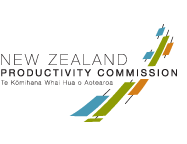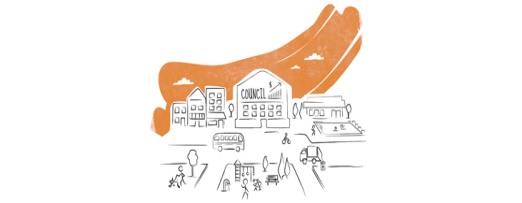 Priority Routinet
Local Government briefing
Priority Routinet
Local Government briefing
Hon Nanaia Mahuta
Minister of Local Government
Title:
Work programme to support local government funding reform
Date:
8 February 2018
Key issues
The Department has prepared a local government funding work programme, in order to ensure the
1982
Government is wel positioned to respond to the Productivity Commission’s recommendations on
local government funding reform in November 2019. This briefing accompanies the Governance for
Wellbeing briefing, as these two work programmes are closely linked.
Act
Action sought
Timeframe
Note the contents of this briefing
At your convenience
Agree to the high-level outline of the work programme
Direct officials to focus on any specific work areas
Information
Contact for telephone discussions (if required)
Name
Position
Direct phone After hours
Suggested
line
phone
1st contact
Michael Lovett
Partnership Director
04 474 8192 021 243
9756
Official
Ben Goodchild
Senior Policy Analyst
04 494 0511
the
Return to
Ben Goodchild
Cohesion reference
3W2DU3RAJ5R2-477757174-122
Ministerial database reference LG201900076
under
Released
IN-CONFIDENCE
Page 1 of 7
The Department of Internal Affairs
Te Tari Taiwhenua
Purpose
1. The purpose of this briefing is to outline the Department of Internal Affairs’ (the
Department’s) intended work programme to support reform of local government
funding.
Background
You wil have a significant role in responding to the Productivity Commission’s inquiry
2. The Productivity Commission (the Commission) will release its final report on local
government funding and financing reform in November 2019. The inquiry is canvassing
a number of issues, including:
2.1
what factors are driving local government costs and whether rates are
affordable;
1982
2.2
what are the options for new local government funding and financing tools;
Act
2.3
what are the current frameworks for capital expenditure decision-making; and
2.4
whether changes are needed to the regulatory arrangements overseeing local
authority funding and financing.
3. As Minister for Local Government, you will have a significant role in the Government’s
response to the Commission’s final report. The Commission’s draft report, due for
release in mid-2019 is also expected to generate significant public interest. The
Information
Department is therefore preparing a programme of work to support you in this role.
Advice on funding and financing must be considered within the context of wider local
government reform, and vice versa
4.
Official
In order to support you when the Commission’s final report is released, the
Department needs to be wel placed to comment on local government funding and
financing issues. The Department therefore intends to begin a work programme that
the
wil seek to analyse the funding and financing chal enges facing the local government
sector and to better understand the views of the sector representatives and interest
groups.
under
5. This work programme will ensure that officials are well placed to begin advising you on
the Commission’s findings, fol owing release of its draft report (expected in June) and
immediately after the Commission’s final report is released in November 2019. This
wil in turn support the implementation of meaningful reforms.
6. Your portfolio already contains an ambitious programme of work that seeks to reform
many aspects of local government including water infrastructure, governance
Released
arrangements for community wellbeing and resilience to natural hazards and climate
change. Within this context, it is necessary that the ongoing sustainability of the local
government funding system be carefully examined. The design of local government
funding and finance wil have a significant impact on the success of changes to the
wider system of local government.
7. The Productivity Commission inquiry provides an important opportunity to begin a
public conversation on what the future local government funding system should look
like within the context of these wider chal enges.
IN-CONFIDENCE
Page 2 of 7
The Department of Internal Affairs
Te Tari Taiwhenua
8. To provide you with timely advice on these and other matters, the Department first
needs to develop its understanding of the potential impacts of reform proposals. By
beginning this work programme now, the Department will be well placed to build on
this conversation to ensure that our advice will coalesce with other areas of the local
government work programme and wider government reforms (e.g. the Tax Working
Group’s findings). This work programme will also enable us to advise you of the local
government sector’s views.
What wil the local government funding work programme involve?
9. We see the programme split over three key workstreams (see Appendix A – front page
A3) – an initial system diagnostic, the development of principles and criteria for
assessing the funding and financing options, and an assessment of a range of options
for reform.
1982
The System Diagnostic
Act
10. The system diagnostic will review two core aspects of local government funding and
finance: cost drivers; and financial management systems. The Department wil seek to
complete the system diagnostic and brief you on the results and key findings by the
end of May 2019.
11. As part of the system diagnostic, the Department will review the local government
funding and financing system to determine what cost drivers exist in the system, and
where they fal . This would include assessments of:
Information
11.1 how the cost-drivers affect different kinds of councils (e.g. high growth, rural,
provincial etc.);
11.2 the effectiveness of existing local government entitlements and whether take-
up is reflective of eligibility; and
Official
11.3 whether or not the changing inequalities in household income are reflected in
the distribution of rates pai
the d by households.
12. The system diagnostic will also review the local government financial management
system and existing controls and obligations facing councils. This would include
assessments of: under
12.1 what discretion councils have in the design of their funding regimes, and what
are the barriers to the use of this discretion;
12.2 how this discretion leads to different outcomes in terms of rates paid across
different types of councils;
12.3 whether the current powers, controls and obligations are consistent with the
Released
issues, opportunities and risks within the system and importantly lead to good
financial management; and
12.4 the current operation of depreciation charging, and the impact that this has on
councils’ ability to fund infrastructure renewal.
Once the system diagnostic is complete, the Department wil establish sector reference
groups to consider the results and assess options for reform.
13. In April 2019, the Department will look to establish a series of sector representative
reference groups. The reference groups will have several purposes including:
IN-CONFIDENCE
Page 3 of 7
The Department of Internal Affairs
Te Tari Taiwhenua
13.1 providing feedback and advice on officials’ work to design the principles and
criteria that wil be used to assess the local government funding system (to be
finalised by June 2019);
13.2 testing the results of the system diagnostic with different types of councils (e.g.
high growth, rural, provincial etc) when it is finalised in May 2019. This wil help
officials to better understand what aspects of the system diagnostic generate
interest and contention; and
13.3 assessing who will likely benefit and who will pay as a result of different
packages for reforming the status quo (during the second half of 2019).
14. The Department wil continue to engage regularly with these sector reference groups
throughout the work programme. Our ultimate intention in establishing these
reference groups is to build a final package of reform that delivers real benefits for the
1982
majority of local authorities. The Department will seek your agreement to any
finalised criteria and options for reform that are developed following engagement with
the reference groups.
Act
15. The Department has already begun a regular meeting with central government
agencies to identify where work is being advanced that has implications for local
government funding. This includes the Ministry of Business, Innovation and
Employment (for the Urban Growth Agenda), the Treasury (the Infrastructure Funding
and Financing work programme) and the Tax Working Group.
16. The Department wil also seek to continue engagement with sector representatives
Information
such as Local Government New Zealand and the New Zealand Society of Local
Government Managers. The Department will also work to engage with other interest
groups, such as Infrastructure New Zealand, Local Government Business Forum and
ratepayer groups.
Official
The Work programme wil be internal y funded, but is reliant on the 2019 Budget Bid
17.
the
The core aspects of the work programme wil be undertaken by the Department and
funded from within existing baselines. However, the work-programme outlined for the
2019/20 financial year is dependent on the outcome of the 2019 Budget bid. If the
Budget bid is unsuccessful, the Department wil need to significantly scale back the
under
extent of our intended analysis of potential funding and financing reforms.
The Department wil provide you with support during the work
18. Several aspects of the work programme will require ministerial directives and
decisions. The Department will brief you and seek your agreement regarding:
18.1 the compo
Released sition of the sector reference groups (in April 2019);
18.2 the objectives and criteria used to measure success (in June 2019);
18.3 the work programme’s scope, including any options that are off the table (in
July 2019); and
18.4 the Department’s high-level findings on the local government funding system
and options for reform (in November 2019).
19. Additionally, the Department will brief you on the progress of the Commission’s
review, particularly after the release of the draft report (currently scheduled for July)
and the final report in November.
IN-CONFIDENCE
Page 4 of 7
The Department of Internal Affairs
Te Tari Taiwhenua
20. Given that the Commission’s inquiry was agreed in the Government’s Coalition
Agreement, you may wish to consult with the Government’s coalition partner and
ministerial colleagues when we seek your agreement on key aspects of the work
programme outlined above. The Department will provide you with briefings and
talking points to support these discussions.
21. If you agree to the general direction of the Department’s proposed work programme
on local government funding and financing, we wil provide further detail on the
proposed programme workstreams, including the approach to engaging with the local
government sector.
Recommendations
22. We recommend that you:
1982
a)
note the high level contents of the Department’s intended work
programme for local government funding reform;
Act
b)
agree to the general direction of the programme of work, including:
Yes/No
i.
the system diagnostic (to be completed by June 2019);
ii.
the establishment of sector reference groups to support the
development of criteria and objectives for the work
programme (to be finalised by June 2019)
iii.
Information
the investigation of options for local government funding and
financing system reform (by November 2019); and
iv. the provision of advice on the Productivity Commission’s final
report (by December 2019).
Official
c)
direct officials to focus on any specific areas of the system
diagnostic outlined in this paper.
the
under
Michael Lovett
Released
Partnership Director
Hon Nanaia Mahuta
Minister of Local Government
/
/
IN-CONFIDENCE
Page 5 of 7
The Department of Internal Affairs
Te Tari Taiwhenua
1982
Act
Information
Official
the
under
Released
IN-CONFIDENCE
Page 6 of 7
The Department of Internal Affairs
Te Tari Taiwhenua
Appendix A: Local government funding and financing programme of work
1982
Act
Information
Official
the
under
Released
IN-CONFIDENCE
Page 7 of 7
 Local Government Funding and Financing
February 2019
March 2020
System Diagnosis
Objectives
Options
Assessment
Decisions
January – June 2019
April – December 2019
July – September 2019
October – December 2019
December 2019 – March 2020
Key issues and questions
Key issues and questions
Key issues and questions
Key issues and questions
Key issues and questions
Local Government Funding and Financing
February 2019
March 2020
System Diagnosis
Objectives
Options
Assessment
Decisions
January – June 2019
April – December 2019
July – September 2019
October – December 2019
December 2019 – March 2020
Key issues and questions
Key issues and questions
Key issues and questions
Key issues and questions
Key issues and questions
1982
1) What are the cost drivers
1) What are the principles that
1) How are local government
1) What is the Department's
1) What are the Government’s
in the system – and where
ought to be used to assess
systems funded and financed
assessment of the current
major decision points?
do these costs fall?
the system?
elsewhere? How comparable
funding and financing system
2) What is the preferred timing
Act
2) How fair and affordable is
2) What does an assessment of
are they to the issues faced by
2)
What does the Department
of reforms?
the rating system (who
the current system against
New Zealand?
recommend and how does this
3) Identify and integrate
pays, where, and how)?
these principles tell us
2) What are the options to
differ from other agencies and
connections with other
3) Is the current model of
about its current
respond to the problems
stake-holders?
initiatives
infrastructure funding and
performance?
identified in the system
3)
What is the assessment of
4) Ministerial groupings and
financing fit for purpose,
3) What are the outcomes and
diagnosis?
various sector groupings?
committees
and If not, why not?
objectives that we are
3) How does the PC’s draft
5) Engagement with national
4) Are councils wellbeing
trying to achieve?
report approach possible
councils and appropriate
Information
aspirations funded
reform?
stakeholder groups
appropriately?
4) What are the impacts of
reform options on wellbeing?
Engagement focus
Official
regular, ongoing discussion and engagement with the local government sector, including LGNZ, SOLGM, LGFA, individual district, regional
and unitary councils, and representative groups of local government authority types (e.g. high growth, rural, declining population)
the
Supporting work programme:
Supporting work programme:
Supporting work programme:
Supporting work programme:
Supporting work programme:
Review of cost drivers and
Reference groups and
Identification and review of
Assessment of
Preparation of briefings
under
current responses (inc.
steering groups consider
alternative funding tools
perspectives: Sector, CG
and Cabinet Papers to
affordability)
system diagnosis,
Identification and review of
and SIGs
allow decisions
principles and current
alternative financing rules,
Review of LG financial
performance
controls and reporting
Development of
Communications plan
management system,
obligations
Departmental Advice
controls and obligations
Government agrees scope
Evaluation of alternatives
Review of CG support /
Released
of funding review work
Assess Productivity
welfare payments for Local
Commission submissions
Government costs
Issues
Public consultation on Issues
Draft report
Feedback on draft report
Final report
Paper
Paper (Nov 2018 – Feb 2019)
(estimated June release)
(by 30 Nov)
Page 1 of 2















 Local Government Funding and Financing
Outcomes sought
February 2019
March 2020
LGNZ / SOLGM
Recognise a better
Local Government Funding and Financing
Outcomes sought
February 2019
March 2020
LGNZ / SOLGM
Recognise a better
Engage, keep informed, monitor views and reactions
deal for local
Special Interest
government
Groups
The balance of
1982
Sector group 1 (high growth councils)
Establish sector groups to
authorities support
Local Government
represent the interests of
reforms, as they
Act
Sector group 2 (councils facing de-population issues)
Sector groups
different types of local
ensure real benefit
authorities
Sector group 3 (Rural provincial)
for the majority
Sector group 4 (Medium Growth Urban areas)
Stocktake
Identifying objectives
Government
What are the options?
relevance of work
What do agencies
and criteria
Support for reform
Information
programme to
programme,
agencies
see as the system
other agencies
problems
particularly from
central agencies
Agency round-table (March)
Agency round-table (May)
Official
the
Socialise PC
Agree to the
Receive and
Minister
Socialise
report and
general direction
Agree /
review
scope
Department’s
Cabinet
Satisfaction and
of
of the work
direct
questions
Department’s
findings and
Programme
paper
ownership of reform
under
programme,
programme
of Action
Local Government
with
high level
next steps
including sector
scope
programme
findings
colleagues
with
(c. Feb
engagement
colleagues
2020)
Released
Cabinet agreement
Discuss level
Present
to reforms, support
Agree with
Discussion on
Senior
Consultation on
Ministers what
of indicative
Ministers with
across diverse
programme
Recs of draft
support for
initial impact
Ministers
options are off
PC reform
portfollios
objectives
the table
Dept findings
analysis
Page 2 of 2
 Priority Routinet
Local Government briefing
Hon Nanaia Mahuta
Priority Routinet
Local Government briefing
Hon Nanaia Mahuta
Minister of Local Government
Title:
Local Governance for Community Wellbeing – Strategy and
Mechanics
Date:
8 February 2019
1982
Key issues
Act
This briefing:
further frames the Local Governance for Community Wellbeing work;
outlines some mechanics of the policy process;
notes next steps; and
seeks your direction on elements of scope.
It accompanies the Funding and Financing briefing as these programmes of work are closely linked.
Information
Action sought
Timeframe
a)
Note the information set out in this report;
February 2019
b)
discuss the proposed kaupapa and scope with officials in February
Official
2019; and
c)
approve the proposed work plan and direction.
the
Contact for telephone discussions (if required)
Name
Position
Direct phone After hours
Suggested
under
line
phone
1st contact
Helen Wyn
Deputy Chief Executive
021679655
Justine Smith
Partnerships Director
0272829976
Return to
Justine Smith, Level 9, 45 Queen Street, Auckland
Released
Ministerial database reference LG201900077
IN-CONFIDENCE
Page 1 of 9
Te Tari Taiwhenua
Department of Internal Affairs
Purpose
1.
This briefing further frames the Local Governance for Community Wellbeing
(Governance for Wellbeing) work; outlines some mechanics of the policy process;
notes next steps; and seeks your feedback on elements of scope and process.
Background
2.
On 29 October 2018, Cabinet agreed to consider the future role of local governance in
New Zealand in delivering intergenerational wellbeing for all New Zealanders. At that
time you agreed to report back to Cabinet in April 2019 on “…a set of guiding principles
anchored in the goal of intergenerational wellbeing…” [CAB 18-MIN-0527 refers].
3.
In December 2018, you received a briefing that set out a high level approach to
shaping the work programme, including some key themes for discussing governance
1982
with the sector and how we intended to engage with the sector [briefing LG201801452
refers].
Act
Talking to the Local Government Sector
4.
Since the December briefing, we have talked to Northland local government Chief
Executives and senior officials and tested our thinking on the four themes (inclusive
regional economic growth, environmental responsiveness, social cohesion and
community infrastructure), as well as our intended operating approach (discussed
below). The conversations were a useful way to ‘road test’ our narrative and draw out
sector views on the barriers preventing them from expanding further into the broader
Information
‘wellbeing space’.
5.
The approach taken (i.e. informal high trust conversations on our draft thinking and
approach) reflects the way we propose to approach sector engagement on this work
programme. This is discussed further later in this briefing.
Official
S 9(2)(ba)
the
under
7.
The four themes articulated have held up as a way to anchor the objectives of this
work programme in real-life examples. The conversations with the Chief Executives
Released
did emphasise for us that to make this programme enduring and relevant to our
diverse local authorities and communities, intergenerational system change will come
from a new approach to governance.
8.
We are starting to progress policy thinking on the objectives, scope and deliverables of
the kaupapa. We will continue to test our thinking with the sector as we further
explore the issues and build the work programme.
IN-CONFIDENCE
Page 2 of 9
Te Tari Taiwhenua
Department of Internal Affairs
This Briefing
9.
This briefing follows on from our December 2018 advice by fleshing out the work
programme (i.e. more detail on the objectives and framing of the work programme,
the policy considerations that inform the work and areas for your feedback and
direction).
10.
Attached to this briefing is:
a.
an A3 of how this work strategically relates to overall local government system
reform to drive wellbeing (Attachment A:
Local Government System Approach to
Deliver on Wellbeing 2019); and
b.
an A3 on the flow and timing of the Governance for Wellbeing work i.e.
programme timing, Cabinet decisions and local government sector engagement
1982
(Attachment B:
Governance for Wellbeing Work Flow and Engagement 2019).
Framing the Kaupapa
Act
11.
Attachment A,
Local Government System Approach to Deliver on Wellbeing 2019,
shows how we see this work aligning with the two other strategic plays (Three Waters
Review and Local Government Funding and Financing) and broader government
reform work programmes that impact on local government. The attachment frames
the work as follows.
12.
This Government is a Wellbeing Government. The release of the Wellbeing Budget in
Information
2019 will confirm that commitment and underpin a broad agenda to improve
wellbeing outcomes for all New Zealanders.
13.
A key component of this will be ensuring that current and future governance
arrangements can promote and safeguard intergenerational wellbeing in New
Official
Zealand’s diverse communities. You are giving effect to this by driving a strategic work
programme to strengthen the local government sector’s ability to understand and
contribute to wellbeing, and to empower communities to determine what their
the
wellbeing is and how to best improve it.
14.
There is also a gap in leadership of work around the intergenerational and
system/governance aspects of this Government’s wellbeing focus (which to date has
under
understandably focused on establishing national-level strategic priorities and related
measurement). This programme could help to fill that gap at the local level.
15.
Reinstating community wellbeing into the purpose statement of the Local Government
Act 2002 (LGA02) will help to elevate wellbeing as a focus for the local government
sector. However, the amendment will not in itself drive significant changes in the
Released
governance or operations of councils to enable wellbeing. Nor will it address inherent
tensions between the local government sector and the wider community sector
regarding where solutions to wellbeing lie, and who should take responsibility for
these. Or, fundamentally, how to reposition the relationship and respective
accountabilities’ of the two main players of the public sector - central and local
government.
16.
Wellbeing is at heart, about the quality of life and the lived experience we have as
individuals and as part of a community. But what that means for any person or
community at any point in time, can change. The goal of
intergenerational wellbeing
involves making decisions and taking action in the present, to identify and secure
IN-CONFIDENCE
Page 3 of 9
Te Tari Taiwhenua
Department of Internal Affairs
wellbeing now and into the future, including building capacity to identify and adapt to
changing needs and circumstances.
17. That means we need to work in a meaningfully different way to think about and
address issues. Otherwise, we risk only addressing point-in-time issues, not driving the
adaptable and sustainable change we need in the system, to be equipped and ready to
address future issues.
18. Local government is not solely responsible for community wellbeing. Communities
themselves need other mechanisms, and central government will always have a
profound impact on community wellbeing. The intended outcomes need to
acknowledge these impacts, and build in the imperative for all players, including iwi, to
partner and collaborate.
19. This means exploring models of governance that exist outside of our current 1982
institutional arrangements and that potentially demonstrate different ways of
operating for all the parties involved (central and local government, Māori/iwi,
Act
community). Some of these models are already being explored in ‘pockets’ around the
country (e.g. ‘eco-system’ multi-party collaborations in delivering services) others are
system change models that other countries are assessing (e.g. community
participatory budgeting).
Objectives and Deliverables
20. The objectives of the work programme will be understanding how new ways of
Information
governing at the local level can maximise community wellbeing, what changes are
needed to achieve this, and how we instigate that change.
21. There are also underlying/second tier objectives that we intend to build into our policy
framework and test our thinking against. Our approach will need to: include
Official
mechanisms for growing capability and capacity in communities so they are in a
position to determine and identify how to improve outcomes. We also need to be
constantly thinking about civic part
the icipation so that engagement is genuinely inclusive
and reflective of the demographics of our communities.
22. As we work towards the update to Cabinet in April 2019 on guiding principles, it would
be helpful to crunch the objectives of the Local Governance for Community Wellbeing
under
kaupapa down into one clear statement. An early starting point could be something
like, “
local governance in the delivery of public goods and services is arranged to
improve community wellbeing now and in the future”. We will test our thinking on the
objective/s and outcome statement as we further work with our sector partners. We
would welcome your feedback on this kaupapa.
Released
23. We recommend that the tangible deliverable of the Governance for Wellbeing work
programme is, by November 2018, a
Local Governance for Community Wellbeing
Strategic Action Plan (the Plan). We would like to discuss with you the following
proposal.
24. We propose the Plan is a pragmatic functional framework that does several things:
a. Sets out a framework for the future state of local governance.
b. Contains immediate working cases for testing of new governance approaches e.g.
potentially governance and management of three waters and priority cases
identified under our four themes.
IN-CONFIDENCE
Page 4 of 9
Te Tari Taiwhenua
Department of Internal Affairs
c. Provides a set of strategic, policy and regulatory changes required to the local
government system to embed an intergenerational wellbeing approach.
d. Sets out a proposed work programme of priority actions post 2019, in conjunction
with other reform work such as resource management, housing and resilience.
e. Sets out a process through which further proposals for change can be socialised,
tested and developed with the sector as part of a long-term change programme.
25. We look forward to discussing this proposed Plan further with you.
The Mechanics of the Policy Process
26. To give effect to your objectives, we may need to action strategic, policy and
regulatory change. Assessing this will be part of the policy process and we will seek
your direction at each stage on any implications in terms of the ‘mechanics’ of how we
1982
implement change.
27. For example, the systems, structures and processes of local government are definitely
Act
in scope, but also potential changes to governance arrangements and approaches
involving central government, local government and community, including Māori/iwi
entities.
28. All models and approaches for strengthening the delivery of wellbeing outcomes are in
scope. That includes co-partnership, co-production, decentralisation, subsidiarity and
localism. This scope will narrow as options are analysed and assessed for viability in
Information
the New Zealand context, but initially, we are keeping an open mind. Early case studies
and models we are considering include the Southern Initiative, the Te Hiku iwi-Crown
Accord (a social accord ‘redress’ arrangement with collaborative governance and
strong links between their social foundation and their capability and economic
initiative development) and community planning models in Northern Ireland that are
Official
embedding wellbeing through community ownership of the kaupapa.
29. We noted in our December 2018 briefing that we were proposing to approach the
the
Governance for Wellbeing work programme by shaping the conversation through
wellbeing themes, rather than attempting to look across every function delivered by
central or local government. Functions and processes, however, will undoubtedly be
under
raised in discussions as potential options take shape. Therefore, we propose to
concurrently undertake a ‘quick cut’ of functions across government to support the
thematic conversation.
30. We will also be assessing any legislative and regulatory constraints and/or
opportunities. The LGA02 already has some flexibility and provision to allow for
governance development, e.g. co-governance and expanded roles of community
Released
boards and committees. The LGA02, however, is still prescriptive in some areas, and
was designed on the basis that every part of New Zealand should have similar forms of
local and regional governance and community accountability. S 9(2)(g)(ii)
31. Parts of the broader legislative and regulatory framework relevant to local government
are also currently under review e.g. the Resource Management Act 1991. These
reviews will need to be closely followed, to align any changes in these frameworks with
your overall objectives for governance for wellbeing.
IN-CONFIDENCE
Page 5 of 9
Te Tari Taiwhenua
Department of Internal Affairs
Draft Guiding Principles and Governance for Wellbeing work programme
32. Attachment B
Governance for Wellbeing Work Flow and Engagement 2019 shows the
more detailed workflow for the Governance for Wellbeing work stream and has a
detailed description of how we will work with the sector.
33. In April 2019, you are due to report back to Cabinet on guiding principles anchored in
the goal of intergenerational wellbeing. Below, we sketch out our early thinking on the
draft principles. We welcome your feedback on these.
a.
Local choice and voice is reflected. This is not only a two-way central and local
government conversation or change process. Communities and the people who
live in them are the primary beneficiaries of governing activities. Citizens,
communities, iwi/Māori speak for themselves and their expertise and needs must
be incorporated.1
1982
b.
Reflect what is uniquely important to New Zealand. We acknowledge that there
are things that make New Zealand unique (for example, the relationship between
Act
tangata whenua and the Crown under the Treaty of Waitangi/Te Tiriti) and the
growing diversity of our communities (as one of the top five most diverse nations
in the OECD). Recognising our uniqueness forms part of the wellbeing of New
Zealanders and so should be reflected in options developed.
c.
Governance that is fit-for-purpose. As our communities are diverse they require
options and approaches that meet their individual needs. We will give due regard
Information
to the breadth of the lived experience in New Zealand. We are approaching this
from a ‘menu for change’ perspective rather than one size fits all.
d.
Provide for the Future: New Zealand communities will develop and evolve and this
impacts on the nature and extent of their reliance on, and relationship to,
Official
governance arrangements. We will design change with regard to the needs of
New Zealand’s communities and the optimal nature and role of local government
the
throughout the next 50 years. This is at the heart of the goal of
intergenerational
wellbeing - making decisions and taking action in the present, to identify and
secure wellbeing now and into the future.
How we are working under
34. Based on what you want achieve through and from this work, we have developed the
following ‘operating protocols’ for how we will support this work. We intend to be:
a.
Internationally aware. Other countries are moving towards better
local/community governance for wellbeing and are exploring emerging and
innovative approaches. This is a significantly advanced discussion from the last
Released
time central and local government in New Zealand debated wellbeing outcomes
1 We do not intend a formal consultation process in communities. We are already aware there is considerable
‘consultation fatigue’, particularly from those groups that are asked for input on a regular basis e.g. Māori/iwi entities.
Central and local government have both asked questions of New Zealanders about wellbeing and related issues. We
intend to listen to those answers, rather than asking the questions again e.g. the input of community to wellbeing has
been extensive through the Statistics New Zealand Wellbeing indicator work and SOLGM’s Community Wellbeing
Framework. Local government also work closely with its communities and working in partnership with local government
will provide a wealth of understanding.
IN-CONFIDENCE
Page 6 of 9
Te Tari Taiwhenua
Department of Internal Affairs
(when wellbeing was added to the LGA02) with an international movement and
discipline to draw on. We will engage with, and learn from, international
experience.
b.
Domestically focused. We will ensure we do not overlook the work already done
at home in driving good governance and community-bespoke solutions. This
includes public sector (central and local)-led initiatives and community and place-
based initiatives. We will also ensure that any future options developed for your
consideration are appropriate for New Zealand’s context.
c.
Working in Partnership. The ‘how’ of how we work together is as important as
‘the what’. Credibility is likely to be enhanced if the options are designed through
working partnerships that utilise expertise and experience, in particular with the
local government sector. We are committed to a relationship that is based on the
1982
guiding principles of respect, reciprocity and trust, as agreed at the Central Local
Government Forum 2018 [Cab-18-MIN-0527 refers]. We will work closely with the
Act
sector from the outset. We discuss this further below.
d.
Open minds. We will keep an open mind on the direction of travel and will not
narrow conversations prematurely. The four themes that will be initially explored
are guiding themes only and need to be understood as case studies or examples
to anchor and operationalise the thinking. Communities define their own
wellbeing and this changes across time and place.
Sector Engagement
Information
35. As noted in paragraph 34.c. above, we want to work closely with the local government
sector2, and others, on this work. We consider that we can run a transparent and
inclusive process that is genuine in its partnership approach, without formally
establishing co-decision points at each stage. Ultimately, the decisions involving
Official
central government will need to be made by Cabinet. We also will ensure early
Māori/iwi engagement.
the
36. As noted in our December 2018 advice, we are working in a high-trust engagement
model, this involves sharing all our thinking in draft with ‘Critical Friends’, seeking out
specific expertise, encouraging broad and diverse input, and utilising working groups
under
and a range of forums to encourage conversation. All advice that we bring to you, and
ultimately to Cabinet, will have been developed and tested with the local government
sector and related parties.
S 9(2)(f)(iv)
Released
2 While the local government sector provides visible and practical scope for collaboration, avenues for effective
engagement across the wider range of community level stakeholders are less obvious. Our initial engagement
will therefore be predominantly with the local government sector while avenues for more inclusive and wider
involvement are explored.
IN-CONFIDENCE
Page 7 of 9
Te Tari Taiwhenua
Department of Internal Affairs
S 9(2)(f)(iv)
38.
Regarding sector engagement, we propose establishing a formal Reference Group in
June 2019. We think that this formal (elected members/senior officials) group is better
served by coming together when we have concrete material for them to engage on,
rather than during the iterative ground-up working stage. We welcome your feedback
on this.
Delivering system change
39.
In December 2018, we also noted that we would investigate further across central
government how to leverage and align with broader reforms that impact on wellbeing.
40.
Current reform programmes across government could significantly impact at local
1982
government level over the next few years e.g. the review of the Resource
Management Act, addressing urban housing pressures and environmental and
Act
resilience responses. In addition, other priority areas such as child poverty, youth,
mental health and education reform will all likely require local government support
and/or involve community level choices and actions. All of these are likely to have
governance (and management) implications for local government and potentially other
community and non-government partners.
41.
Therefore, how we design and deliver the Plan is relevant to not just our own local
government work programme, but to how wider government successfully delivers
Information
reform and ultimately improves intergenerational wellbeing.
42.
Governance (like funding and financing) is at the core of how the public sector, central
or local, functions and delivers goods and services, and defines and shapes community
experience.
Official
43.
There is a unique opportunity through your work programme on Governance for
Wellbeing to deliver a platform that can support cross-government work in terms of
the
local governance. This is significant in its scale, however. We will need to work closely
alongside broader system reform processes to ensure that we leverage any
opportunity, identify barriers and constraints, and manage any risk resulting from the
under
pace and scale of change. We will ensure you are advised regularly on this and would
welcome a discussion with you on the scale and alignment of wider government
reform.
The Next Steps
April 2019 Cabinet paper
Released
44.
You are due to speak at the SOLGM Gala Dinner on 11 April, 2019. SOLGM are
intending to focus on wellbeing as a key theme at this dinner. If you agree, we would
like to time your update to Cabinet on the guiding principles for early April (or late
March). This will mean you will have had Cabinet agreement/feedback that could
support your messages around this kaupapa at the dinner.
Ministerial Oversight Group
45.
Prior to the Cabinet update, you may also have an opportunity to discuss with your
colleagues in the proposed Ministerial Oversight Group the scope of this project (and
the draft guiding principles).
IN-CONFIDENCE
Page 8 of 9
Te Tari Taiwhenua
Department of Internal Affairs
46. If the Group does not meet prior to Cabinet in April, your colleagues will be consulted
during the Cabinet paper consultation process. We are preparing an A3 on the overall
approach and the draft principles for Cabinet (pending your feedback on this briefing).
This A3 could also touch on the implications of the broader government reforms we
have mentioned, and emphasise the need for connectivity to maximise opportunity for
successful local government sector change. We welcome your feedback on this.
Education advice
47. We will be advising you shortly on some of the review work underway in the education
portfolio (particularly proposals around the governance role of School Boards and
Regional Hubs) and how this may align with our work. There may be opportunities to
align with potential education system changes. We will work with the Ministry of
Education to assess this.
1982
Communications
48. We are preparing a communications package (pending your feedback on this report)
Act
that would support official discussions of the work programme in the local government
sector, and in the public domain. This will also cover potential forums and
opportunities this year to promote and engage on the work programme.
49. We look forward to discussing with you the proposed kaupapa and considerations set
out in this briefing and agreeing the direction of the work programme.
Information
Recommendations
We recommend that you:
a)
note the information set out in this report;
Official
b)
discuss the proposed kaupapa and scope with officials in
Yes/No
February 2019; and
the
c)
approve the proposed work plan and direction.
Yes/No
under
Helen Wyn
Deputy Chief Executive
Central Government/Local Government Partnerships
Released
Hon Nanaia Mahuta
Minister of Local Government
/
/
IN-CONFIDENCE
Page 9 of 9
Attachment A: Local Government System Approach to Deliver on Wellbeing Budget 2019
In confidence
February 2019
This Government is a Wellbeing Government. The release of the Wellbeing Budget in 2019 confirms that commitment and will underpin a broad agenda to improve wellbeing outcomes for all New Zealanders. The Minister of
Local Government is giving effect to this by driving a strategic work programme to better enable local government and communities to improve their wellbeing. Re-introducing the wellbeing into the Local Government
Act helps to elevate wellbeing as a focus, however, a system approach is needed to realise intergenerational change. Currently in the local government system we know there are pressure points impacting on
wellbeing. S 9(2)(f)(iv)
Understanding how new ways of governing
Across broader government there are also a range of proposed reforms that could significantly impact at local government level over the next few years.
at the local level can maximise community
Governance is at the core of how the public sector, central or local, functions and delivers goods and services, and defines and shapes community experience. We have a unique opportunity to deliver a platform
that can support cross-government work in terms of local governance.
wellbeing, what changes are needed to
achieve this, and how we enact that
Local Government System Change 2019
change.
And 2019/2020 and Beyond
Proposed objective:
Infrastructure
Housing (underway HUD)
Three Waters: Reform the regulation of water services to deliver better water
Prior ity
Issues
sustainability for all communities
Local governance in the delivery of public
xxxxxxxxxx
xxxxxxxxxx
Resource Management Act (underway MfE)
Environment (underway MfE)
goods and services is arranged to
xxxxxxxxxx
xxxxxxxxxx
improve community wellbeing now
Funding and Financing – local government funding reform
Other areas that are wellbeing focussed e.g. Resilience
and Modernising Voting
S 9(2)(f)(iv)
and in the future.
1982
Governance for Wellbeing. Provide a local governance approach that supports system reform to deliver wellbeing in the present and the future –across diverse communities and adaptable to a range of issues and
Foundation
opportunities
Change
Act
S 9(2)(f)(iv)
Information
Official
the
under
Released
Page 1 of 1



 Attachment B: Governance for Wellbeing Work Flow and Engagement 2019
Attachment B: Governance for Wellbeing Work Flow and Engagement 2019
In Confidence
February 2019
How Are We Engaging?
Engaging with Subject Expertise
Genuine working relationships
Working closely with ‘Critical Friends’ across elected officials,
Expertise/institutional knowledge key
Ensuring broader input
based on sharing policy
local government sector management, community leaders, and
Input will be fluid as the programme develops.
Reference Group
development in draft, building in
Likely to continue throughout life of work programme
sector expertise and ideas,
Māori/iwi
Formal group at
Working with
feeding back and sharing the
Starting with the four themes:
governance level
communities as the
sector voices at every stage.
Thought leaders
-
Regional development (inclusiveness, social procurement)
Non-elected/elected i.e.
Working together like this, builds
project develops
-
Social cohesion (youth engagement in democracy, civics participation etc)
a shared understanding of the
Free and frank tyre kicking through informal conversations in a
Mayors/Chairs/CEs
issues, opportunities and options.
high trust environment
-
Environmental responsiveness (likely to have an initial focus on waste)
Will meet quarterly
Academics and
It is part of the process of
-
Community infrastructure (shared spaces like parks, community centres,
Will advise/engage with
strengthening governance.
Wellbeing or governance expertise helpful, but critical thinking
wellbeing experts
more the priority
potentially school property)
the Minister
To continue throughout the life of work programme
In place for length of work
International
Working partnership with SOLGM (Community Wellbeing Framework and
programme from June
1982
networks and
Indicators)
2019
working groups
Broader central government engagement and working partnerships across
Act
portfolios
S 9(2)(f)(iv)
S 9(2)(f)(iv)
Information
Official
the
under
Released
Page 1 of 1
 Priority Routine
Local Government briefing
Priority Routine
Local Government briefing
Hon Nanaia Mahuta
Minister of Local Government
Title:
Local Elections projects in the context of the wider Local Government
Work Programme: Options for discussion
Date:
12 February 2019
Key issues
1982
This briefing provides options on local elections policy projects for discussion with officials in the
context of the wider Local Government work programme.
S 9(2)(f)(iv)
Act
Action sought
Timeframe
Information
Review this paper in preparation for discussions with officials about the
27 February 2019
Local Government work programme.
Contact for telephone discussions (if required)
Official
Name
Position
Direct phone After hours
Suggested
line
phone
1st contact
Nick Law
Policy Manage
the r
04 460 2264 027 5941719
S 9(2)(a)
Return to
Matthew Walker, Level 9, 45 Pipitea Street
under
Cohesion reference
3W2DU3RAJ5R2-1674971004-1
Ministerial database reference LG201900026
Released
IN-CONFIDENCE
Page 1 of 11
The Department of Internal Affairs
Te Tari Taiwhenua
Purpose
1. This briefing will inform your discussion with officials about a Local Government work
programme for 2019 and beyond that can:
• facilitate and improve elections beyond 2019;
• S 9(2)(f)(iv)
• provide a basis and context for officials’ advice to the Justice Committee in our
role as advisors to the Committee’s Inquiry into the 2017 General Election and
2016 Local Elections (the Inquiry).
2. This briefing recommends taking a multi-year view on local electoral projects,
including considering links to wider issues relating to community participation in local
1982
government.
Act
Executive summary
3. You will shortly be discussing the Local Government work programme with officials.
Local electoral projects will compete for resources within the Local Government work
programme. We are therefore seeking your view of the local electoral work to be
undertaken and the overall priority of local electoral work in that context.
S 9(2)(f)(iv)
Information
Official
the
under
Drivers for the local electoral policy projects
6. A local electoral project could address the operational issues that are priorities for the
local government sector. These are:
a)
postal voting becoming unsustainable;
Released
b)
issues with the local electoral framework (some longstanding). These issues
are being raised in the Inquiry and through other avenues; and
c)
opportunities to enhance the electoral process.
7. Additional examples of the current drivers of the work programme are:
a)
the Local Electoral Matters Bill. S 9(2)(f)(iv)
IN-CONFIDENCE
Page 2 of 11
The Department of Internal Affairs
Te Tari Taiwhenua
b)
representation of Māori on councils continuing to be a chal enging issue for
councils and their communities; and
c)
potentially, the Electoral Access Fund Bill (currently before the Governance
and Administration Committee). This Bil proposes that financial support be
provided to disabled people to participate in parliamentary elections as
candidates and members of political parties. The Bill is likely to prompt interest
in similar changes applying to local elections.
8. More detail on these drivers is provided in
Appendix A. S 9(2)(f)(iv)
S 9(2)(f)(iv)
1982
Act
Information
Official
the
under
Released
IN-CONFIDENCE
Page 3 of 11
The Department of Internal Affairs
Te Tari Taiwhenua
S 9(2)(f)(iv)
1982
Act
Information
Official
the
under
Released
IN-CONFIDENCE
Page 4 of 11
The Department of Internal Affairs
Te Tari Taiwhenua
S 9(2)(f)(iv)
1982
Act
Information
Official
the
under
Released
IN-CONFIDENCE
Page 5 of 11
The Department of Internal Affairs
Te Tari Taiwhenua
S 9(2)(f)(iv)
1982
Act
Information
Official
the
under
Released
IN-CONFIDENCE
Page 6 of 11
The Department of Internal Affairs
Te Tari Taiwhenua
Recommendation
33. We recommend you
review this paper in preparation for discussions
Yes/No
with officials about the Local Government work programme.
1982
Nick Law
Act
Policy Manager
Hon Nanaia Mahuta
Information
Minister of Local Government
/
/
Official
the
under
Released
IN-CONFIDENCE
Page 7 of 11
The Department of Internal Affairs
Te Tari Taiwhenua
Appendix A: Current drivers for changes to the local electoral regulatory
framework
Justice Committee Inquiry
1.
The Inquiry into the 2017 General Election and 2016 Local Elections is before the
Justice Select Committee. Officials from the Department will need to provide advice to
the Committee. The Government response to the Committee’s report will be due
within 60 working days.
Local Electoral Matters Bil
2.
The Local Electoral Matters Bill was reported back to the House by the Justice Select
Committee on 7 December 2018 and is awaiting second reading. The Bill makes
1982
changes that would support regulations for a new voting method, but it also makes a
change to clarify access to age-group and Māori ethnicity demographic information,
Act
which would be helpful for the 2019 elections.
Online Voting
3.
Many local authorities are keen to move to offering an online voting option in local
elections. The Online Voting Working Group is not proceeding with a trial in 2019. The
Group wrote to you seeking Crown funding on 23 November 2018. The Group wishes
to stay involved in future work on developing a trial. We understand that Local
Information
Government New Zealand is likely to approach you soon proposing one or more
options for a joint local and central government project to progress online voting.
Modernising voting
Official
4.
The Modernising Voting Review, to consider the wider issues with voting, was put on
hold while work towards an online voting trial was taking place. Many of the issues to
be considered as part of the review
the will be raised in the Inquiry into the 2017 General
Election and the 2016 Local Elections.
Representation of Māori in local elections
under
5.
Several issues relating to Māori representation in local elections, and proposals for
changes, have arisen in recent years. The general concerns are that the Local Electoral
Act 2001 processes have proven to be too great a barrier to establishing Māori wards
and constituencies. More specific current issues with Māori representation include:
a) providing appropriate representation for Ngāi Tahu on the Canterbury Regional
Council - the Canterbury Regional Council (Ngāi Tahu Representation) Bill is currently
Released
awaiting first reading;
b) Auckland Council has requested changes to its unique requirement for the Council’s
governing body to have 20 members, plus the mayor. The introduction of Māori
wards to establish Māori council or roles has been considered by the council. This
change has not been possible because changes to current legislation are required
before introducing such roles; and
c) if the proposed changes to the Local Government Commission proceed, the future of
the review responsibilities for Māori representation decisions.
IN-CONFIDENCE
Page 8 of 11
The Department of Internal Affairs
Te Tari Taiwhenua
The Electoral Access Fund Bil
6.
The Electoral Access Fund Bill is currently before the Governance and Administration
Committee. Article 29 of the United Nations Convention on the Rights of Persons with
Disabilities confirms the right of disabled people to participation in political and public
life.
7.
The Bill would establish a fund, administered by the Electoral Commission, to be used
by any:
a)
disabled candidate to cover disability-related costs of standing in a general
election;
b)
not-for-profit body running an election education event or producing an
election publication to cover costs of making election education events and
1982
materials accessible; and
c)
registered political party to support the needs of any of their members to
Act
allow them to participate internally within the party.
8.
We anticipate that this wil create an expectation that similar funding is provided for
participation in local elections.
Information
Official
the
under
Released
IN-CONFIDENCE
Page 9 of 11
The Department of Internal Affairs
Te Tari Taiwhenua
S 9(2)(f)(iv)
1982
Act
Information
Official
the
under
Released
IN-CONFIDENCE
Page 10 of 11
 Priority Routine
Priority Routine
S 9(2)(f)(iv)
1982
Act
Information
Official
the
under
Released
IN-CONFIDENCE
Page 11 of 11
Document Outline
























